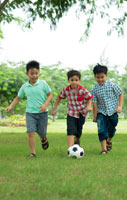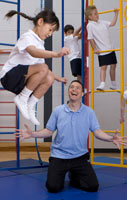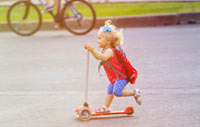Job Search
Tinies has hundreds of childcare jobs across the UK
Our Favourite Ways to Teach Children Physical Literacy at School
Being active from a young age is important, and can have a great impact on all areas of a child's life. In a 2 part series written by Fit For Sport, we'll take a look at how you can help promote your child's physical literacy
What is physical literacy?
Physical literacy can be described as the motivation, confidence, physical competence, knowledge and understanding to value and take responsibility for engagement in physical activities for life - Whitehead, 2016
With this in mind, physical literacy is just as much about children enjoying and feeling confident participating in sports and games, as it's them being capable of different movement skills. Physical literacy is a gateway for your children to learn and develop a wide range of movement skills like running, jumping, throwing and catching, and to develop the confidence and motivation to engage in and enjoy physical activities and sport.
The importance of being active
 Physical literacy is essential for children's lifelong participation in sports, games and other physical activity and their long-term health and well-being. Developing children's physical literacy skills, as well as developing their literacy and numeracy skills, gives them the confidence and ability to interact with the physical environments around them, and the people they meet.
Physical literacy is essential for children's lifelong participation in sports, games and other physical activity and their long-term health and well-being. Developing children's physical literacy skills, as well as developing their literacy and numeracy skills, gives them the confidence and ability to interact with the physical environments around them, and the people they meet.
Physical literacy is developed and promoted throughout childhood by a whole range of different people and environments, and it's the positive experiences of sport and active games at school, at home, and in the community that will give children the ability, the confidence and the motivation to participate in physical activity now and throughout their lives.
In these articles, we will look at the following key environments that have a big influence on a child's physical literacy development, and how you as a parent can help to promote this - at school, in the community and at home.
Helping your child develop their physical literacy at school
A child's school day should be full of opportunities to be physically active and to develop their physical literacy. From cycling to school to participating in an after-school sports club, the school day is the perfect environment for children to get their 60 minutes of physical activity. Research shows that the more active children are at school, the better they learn, concentrate, and behave in an academic environment.
Physical Education (PE)
 The PE national curriculum in key stage 1 and 2 focuses broadly on fundamental movement skills and playing competitive games. A well delivered PE and School Sport programme should be varied, not sport specific, and aimed at helping the children improve and master movement skills, develop physical competence, gain confidence in performing in front of other people, and enhance their social and emotional development.
The PE national curriculum in key stage 1 and 2 focuses broadly on fundamental movement skills and playing competitive games. A well delivered PE and School Sport programme should be varied, not sport specific, and aimed at helping the children improve and master movement skills, develop physical competence, gain confidence in performing in front of other people, and enhance their social and emotional development.
As a parent, you can help your child enjoy PE by understanding what topic your child is participating in, and helping them develop those skills outside of their PE lessons by playing games and activities at home or in the park at weekends, and talking to them about the skills they have learnt or the sports they could apply those skills to.
It's important to understand that PE is only typically 2 hours a week at school, so the more you help your children practice their movement skills the better they will get, and the more they will enjoy their PE lessons! This is exactly the same as helping them develop their literacy skills by reading a book with them at home.
Before-school, after-school and lunchtime sports and activity clubs
Find out what before-school, lunchtime and after-school clubs are on offer at your child's school. Schools are required to offer full and varied extra-curricular activity programmes, so find out what is going on for your child's year group and ask the school or the activity provider for a taster session for your child to try out the club. This could be a great way to introduce your child to different sports and activities, and might help them develop friendships at a new school.
Active travel to and from school

Walking, cycling or scooting to school is a great way to help children get some of their 60 minutes of physical activity for the day, and a great opportunity for them to practice and enjoy fundamental movement skills.
Ask your school if they have an Active Travel to School policy, and find out if there are any parent walking or cycling clubs that you and your child can join. There's nothing more fun for children than to move and interact with other children on the way to school, it's a great way to get their brains firing before the first classroom lesson, and can help you squeeze some exercise into your day too!
Schools are a great place to help children develop their physical literacy, and develop a lifelong love of being physically active. It's these early experiences of physical activity and sport that forge children's perception of sports and of their own abilities in sports and games, so as a parent take an interest in this part of their school day, join in and contribute as much as you can and remember; the more children are active the better they do at school!
Fit For Sport are experts in educating and engaging children and young people through physical activity. They believe that helping children to enjoy being active from an early age will set them on a journey to a healthy, active life.
